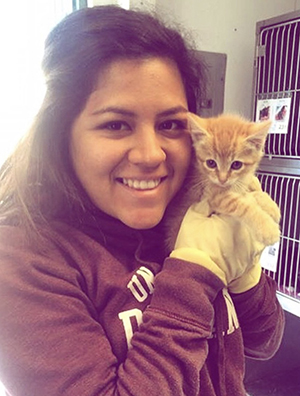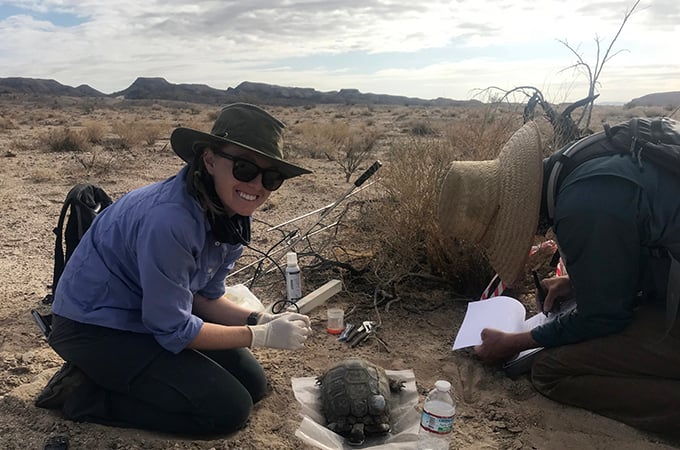When Professor Kathie Jenni first created the May Term course Taking Animals Seriously more than two decades ago, national interest in the topic was growing, and students at the U of R were eager for animal-related service work and scholarship. The one-month course combined an animal ethics class with a hands-on internship at Best Friends Animal Sanctuary in southern Utah. From the beginning, demand quickly exceeded course capacity.
That demand and Jenni’s commitment ultimately led to the interdisciplinary human-animal studies (HAST) minor in the College of Arts and Sciences—this year celebrating a decade of scholarship, service, and outreach.
“There were so many reasons U of R was right for this program,” recalls Jenni, now the program’s director. “The institution highly values innovative teaching, as well as interdisciplinary, experiential, and integrative learning. It also has a strong sense of mission about creating engaged citizens with attentiveness to contemporary trends and social change.”
Jenni reached out for guidance and support from faculty members who taught HAST-related curricula. Environmental Studies Professor Wendy McIntyre, a HAST advisor whose courses in biodiversity and ecology contribute to the minor, says the program fills a need. “Many students want to pursue careers in animal-related work—in animal sanctuaries, rescue, wildlife conservation programs in zoos or with state and federal agencies, and veterinary fields.”
Taylor Dee ’15 puts what she learned to work as a field and wildlife biologist for an environmental consulting company. She says the minor made her aware of issues such as the high volume of domestic animals without homes and human-wildlife conflict. Studying abroad in East Africa, the class discussed the ways wildlife was impacting people’s livelihoods. There, issues involved crop raiding (often by elephants) and loss of livestock via predators such as lions or hyenas. “The HAST program taught me to be open-minded and that many issues are dynamic and not as simple as we'd like them to be,” Dee says.
“The program provides students with the opportunity to examine our relationship with animals from a variety of perspectives, often challenging their own preconceived notions,” says Biology Professor Lei Lani Stelle, a HAST advisor who teaches mapping animals, marine conservation, and a Palau travel course—which all apply to the minor. “They truly benefit from considering viewpoints outside of the pure science framework.”
“Dr. Jenni structures classes from a non-bias[ed] standpoint,” says current student Kaitlyn Garrison ’21 who plans to pursue a career in law, hoping to defend the rights of animals and the environment, “and analyzes the ethics of animals used in industry, testing, food, and personal companionship.”
Now working as a veterinary assistant, Kennia Escobar ’15 said her career allows her to care for those that have no way to speak up for themselves, and in many aspects of her work she refers back to what she learned in the HAST program. “This course demonstrated that small changes in our lifestyle, a few hours of volunteer work, or sometimes even just trying to become more educated can have a profound impact on animals that we never knew we could affect.”

Key to the course is hands-on service at nonprofits such as Hope to Home for Cats in Yucaipa, which borders Redlands. “We don’t have enough employees to socialize the cats, so we’re grateful to have the students’ help,” says President Marita Rutledge. “We have volunteers who graduate but keep coming back.”
Professor Catherine Salmon, whose evolutionary psychology course contributes to the minor, believes the program, which is among only a few of its kind in the United States, is important. “Animal rights in research, factory farming, the plight of endangered species, and how we co-exist with the other residents of our planet are all critical issues,” says Salmon, a HAST advisor.
“Some of us will risk our lives for our animals—rescuing them from fires, for example—while in other cases animals are exterminated not for food, but for fun, fear, or indifference,” Salmon continues. “We should understand why. In addition, we should understand our emotional and social reliance on animals in therapy, as companions, or as co-workers and how we have co-evolved with some of these species in ways that benefit us all.”
To learn more about the human-animal studies minor at the University of Redlands, visit the HAST web page.






